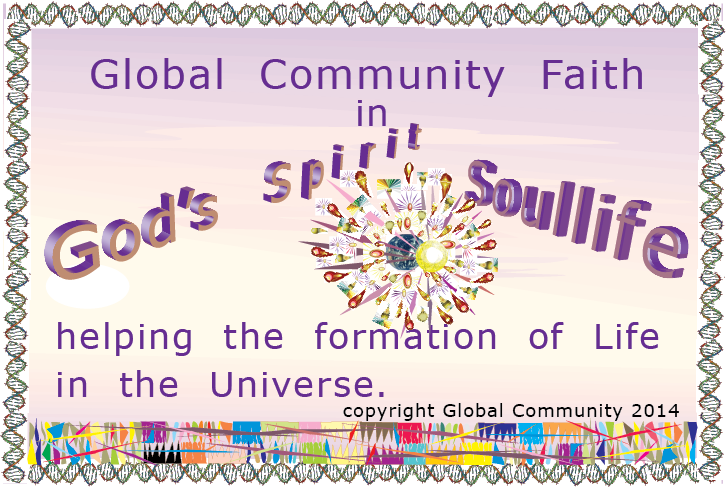
The theme of Global Dialogue 2015 is:
Global Community Faith in God's Spirit, Soullife, helping the formation of Life in the Universe. 
by
SoulLife
andGermain Dufour
Spiritual Leader of Global CommunityProphete of God
August 2014

Global Community Faith in God's Spirit, Soullife, helping the formation of Life in the Universe.
Artwork by Germain Dufour
January 6, 2008
( see enlargement
Note of understanding
The author, Germain Dufour, was educated in a small french Canadian town called Sorel. His religious education was based on the Roman Catholic Church doctrine on faith and morals that it presents as definitive and infallible. The Church's hierarchy is headed by the Bishop of Rome, known as the Pope, who is the leader of the worldwide Catholic Church composed of the Latin Church and the Eastern Catholic Churches in full communion with Rome. The Church holds that Christ instituted the Papacy, upon giving the keys of Heaven to Saint Peter. Catholic doctrine has evolved over the centuries, reflecting direct teachings of early Christians, formal decisions of heretic and orthodox beliefs by Ecumenical Councils and Papal Bulls, and theological debate by scholars. The Church believes that it is continually guided by the Holy Spirit as it discerns new theological issues and is protected infallibly from falling into doctrinal error when a firm decision on an issue is reached. The doctrine teaches that there are two sources of revelation: Sacred Scripture and Sacred Tradition, and that these are authentically interpreted by the Magisterium. Sacred Scripture consists of the 73 books of the Catholic Bible, consisting of 46 Old Testament and 27 New Testament writings. The New Testament books are accepted by Christians of both East and West, with only those who follow Luther putting them at three different status levels. The Old Testament books include some, referred to as Deuterocanonical, that Protestants exclude but that Eastern Christians too regard as part of the Bible. Sacred Tradition consists of those teachings believed by the Church to have been handed down since the time of the Apostles. Sacred Scripture and Sacred Tradition are collectively known as the "deposit of faith". These are in turn interpreted by the Magisterium , the Church's teaching authority, which is exercised by the Pope and the College of Bishops in union with the Pope, the bishop of Rome. Catholic Doctrine is authoritatively summarised in the Catechism of the Catholic Church. The doctrine section of the Catechism is organised according to the Apostle's Creed. The Church also accepts the Nicene Creed. The Catholic Church holds that there is one eternal God, who exists as a mutual indwelling of three persons: God the Father; God the Son; and God the Holy Spirit, which make up the Trinity. Catholics believe that Jesus Christ is the second person of the Trinity, God the Son. In an event known as the Incarnation, through the power of the Holy Spirit, God became united with human nature through the conception of Christ in the womb of the Blessed Virgin Mary. Christ therefore is both fully divine and fully human. It is taught that Christ's mission on earth included giving people his teachings and providing his example for them to follow as recorded in the four Gospels. The Church teaches that through the passion (suffering) of Christ and his crucifixion as described in the Gospels, all people have an opportunity for forgiveness and freedom from sin and so can be reconciled to God. The Resurrection of Jesus gained for humans a possible spiritual immortality previously denied to them because of original sin. By reconciling with God and following Christ's words and deeds, an individual can enter the Kingdom of God. The Church teaches that God the Holy Spirit , God's Spirit, "proceeds" from God the Father and God the Son as a single origin, a belief generally accepted in Western Christianity and expressed in the Filioque clause added to the Latin version of the Nicene Creed of 381, but not included in the versions of the Creed, not derived from the Latin text, that are used in Eastern Christianity, including the Eastern Catholic Churches. The Book of Revelation, often known simply as Revelations or the Apocalypse, is the final book of the New Testament and occupies a central place in Christian eschatology. Revelation makes use of symbolism and visions, mentions angelic mediators, has bizarre imagery, declares divine judgment, emphasizes the Kingdom of God, prophesies new heavens and a new Earth, and consists of a dualism of ages, in other words a present world and a world to come. In terms of being prophetic, the author of Revelation uses the words: prophecy, prophesy, prophesying, prophet, and prophets twenty-one times in these various forms throughout the text. No other New Testament book uses these terms to this extent. Most of the interpretations fall into one or two of the following categories: 1) futurist, which believes that Revelation describes future events (modern believers in this interpretation are often called "millennialists"); and 2) idealist, or symbolic, which holds that Revelation does not refer to actual people or events, but is an allegory of the spiritual path and the ongoing struggle between good and evil.
My symbiotical relationship with you
![]()
B. The fundamental criteria of a global symbiotical relationship ![]()
C. Guiding Souls and God want to help us manage Earth ![]()
D. The Divine Plan and the higher purpose of humanity ![]()
E. Guiding Souls to serve God is a part of a new unifying religion of a modern symbiosis global society: Global Community Faith and Religion. ![]()
F. Is humanity as we know it today on Earth our final destination ? ![]()
G. Global Community teaching ![]()
H. Global Law ![]()
I. New Revelations, by God, delivered through Germain Dufour. ![]()
J. God's Ten Commandments, delivered through Mosess. ![]()
